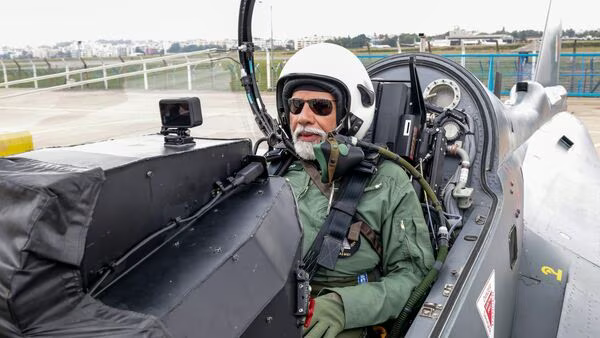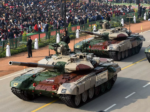Narendra Modi’s Tejas Sortie: A Vote of Confidence in India’s Defence Manufacturing

Image Source: Mint
Prime Minister Narendra Modi’s recent sortie on the Tejas Mark 1, India’s indigenous light combat aircraft, stands as a pivotal moment in India’s journey towards self-reliance in defence. While some dismiss it as mere political optics, the PM’s flight signifies a profound vote of confidence in India’s homegrown defence technology and the Tejas aircraft.
In a tweet following the sortie, PM Modi praised India’s strides in self-reliance, celebrating the collective effort of the Indian Air Force (IAF), Defense Research and Development Organization (DRDO), Hindustan Aeronautics Limited (HAL), and all Indians.
This endorsement aligns with India’s strategic push to bolster its defense capabilities. Notably, the Modi government has already committed to procuring 83 Tejas aircraft, set for delivery starting February 2024, among other significant defense endeavors.
The Tejas program, initiated in the 1980s, aimed to replace the aging MiG-21 fleet. Though its maiden flight occurred in 2001, full certification was only achieved in 2015, owing to numerous challenges in design, engine development, and budgetary constraints.
Hurdles ranged from engine issues with the indigenous Kaveri engine to balancing weight and technological sophistication. HAL’s resilience and adaptability led to significant strides, eventually securing the Final Operational Clearance (FOC) in 2019, signifying readiness for operational deployment.
A landmark agreement between HAL and General Electric to produce F414 engines in India, coupled with the Tejas Mark 2 development, further underlines India’s commitment to indigenous defense manufacturing.
The Tejas program represents a paradigm shift in India’s defense landscape, transitioning from being a major defense importer to a burgeoning exporter. The surge in defense exports, witnessing a 23-fold increase in the last decade, reflects India’s prowess in design and development.
India’s defense industry has piqued the interest of over 85 countries, with BrahMos missiles leading the export front. Tejas, too, has garnered substantial attention. Several nations in Asia and Africa have expressed interest, while discussions with ASEAN and Latin American nations hint at promising breakthroughs.
HAL is engaging in talks with various countries for Tejas exports, with interest from nations like Indonesia, Malaysia, Sri Lanka, and Botswana. Notably, Egypt’s consideration of Tejas stands as a testament to its growing international appeal.
PM Modi’s Tejas sortie not only signifies confidence in indigenous defense but also serves as India’s message to the world—that alongside its rising geopolitical prominence, its defense manufacturing capabilities are ascending to global recognition.
Team Profile

- News Writer
- Harshit Tokas is a Political Science and International Affairs Post-Graduate with a passion for understanding and analyzing complex political landscapes. Skilled in research, data analysis, and policy development. Eager to contribute his knowledge and insights to drive positive change.
Latest entries
 English1 December 2023Ambati Rayudu Backs Ruturaj Gaikwad as a Future Leader of Indian Cricket
English1 December 2023Ambati Rayudu Backs Ruturaj Gaikwad as a Future Leader of Indian Cricket English1 December 2023Changing Tide: Pujara and Rahane Omitted from South Africa Tour Squad
English1 December 2023Changing Tide: Pujara and Rahane Omitted from South Africa Tour Squad Defence1 December 2023India Greenlights Procurement of Advanced Military Assets in Multi-billion Defence Upgrade
Defence1 December 2023India Greenlights Procurement of Advanced Military Assets in Multi-billion Defence Upgrade English1 December 2023Delhi Government Pushes for Completion of Asia’s Largest Wastewater Treatment Plant
English1 December 2023Delhi Government Pushes for Completion of Asia’s Largest Wastewater Treatment Plant









